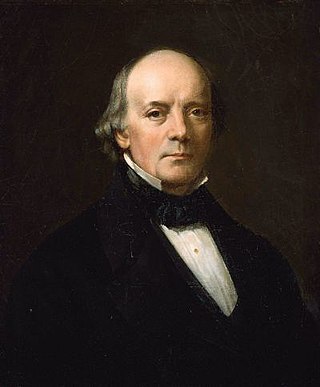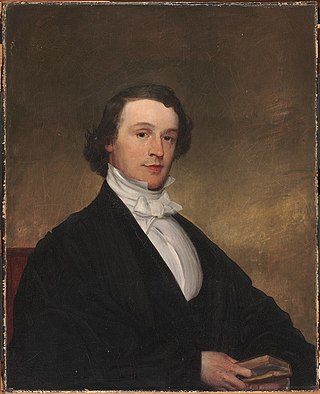
George Ticknor was an American academician and Hispanist, specializing in the subject areas of languages and literature. He is known for his scholarly work on the history and criticism of Spanish literature.

George Stillman Hillard was an American lawyer and author. Besides developing his Boston legal practice, he served in the Massachusetts legislature, edited several Boston journals, and wrote on literature, politics and travel.

Edward Everett was an American politician, Unitarian pastor, educator, diplomat, and orator from Massachusetts. Everett, as a Whig, served as U.S. representative, U.S. senator, the 15th governor of Massachusetts, minister to Great Britain, and United States secretary of state. He also taught at Harvard University and served as its president.

Charles Francis Adams Sr. was an American historical editor, writer, politician, and diplomat. As United States Minister to the United Kingdom during the American Civil War, Adams was crucial to Union efforts to prevent British recognition of the Confederate States of America and maintain European neutrality to the utmost extent. Adams also featured in national and state politics before and after the Civil War.

Sylvester Judd was a Unitarian minister and an American novelist.

James Thomas Fields was an American publisher, editor, and poet. His business, Ticknor and Fields, was a notable publishing house in 19th century Boston.

The American Peace Society is a pacifist group founded upon the initiative of William Ladd, in New York City, May 8, 1828. It was formed by the merging of many state and local societies, from New York, Maine, New Hampshire, and Massachusetts, of which the oldest, the New York Peace Society, dated from 1815. Ladd was an advocate of a "Congress and High Court of Nations." The society organized peace conferences and regularly published a periodical entitled Advocate of Peace. The Society was only opposed to wars between nation states; it did not oppose the American Civil War, regarding the Union's war as a "police action" against the "criminals" of the Confederacy. Its most famous leader was Benjamin Franklin Trueblood (1847–1916), a Quaker who in his book The Federation of the World (1899) called for the establishment of an international state to bring about lasting peace in the world. In 1834 the headquarters of the society were removed to Hartford, in 1834 to Boston, Massachusetts, in 1911 to Washington, D.C. The group is now based in Washington. Its official journal is World Affairs.

The Boston Society of Natural History (1830–1948) in Boston, Massachusetts, was an organization dedicated to the study and promotion of natural history. It published a scholarly journal and established a museum. In its first few decades, the society occupied several successive locations in Boston's Financial District, including Pearl Street, Tremont Street and Mason Street. In 1864 it moved into a newly constructed museum building at 234 Berkeley Street in the Back Bay, designed by architect William Gibbons Preston. In 1951 the society evolved into the Museum of Science, and relocated to its current site on the Charles River.

Clement Moore Butler (1810–1890) was an Episcopal priest, author, and seminary professor who served as Chaplain of the Senate from 1850 to 1853.
Moses Wight (1827–1895) was an artist in Boston, Massachusetts and Paris in the 19th century. He painted portraits of Edward Everett, Louis Agassiz, Charles Sumner, Alexander von Humboldt, and other notables.
The Boston Artists' Association (1841–1851) was established in Boston, Massachusetts by Washington Allston, Henry Sargent, and other painters, sculptors, and architects, in order to organize exhibitions, a school, a workspace for members, and to promote art "for the art's sake."
Amory Hall was located on the corner of Washington Street and West Street in Boston, Massachusetts, in the 19th century. Myriad activities took place in the rental hall, including sermons; lectures by Henry David Thoreau, Ralph Waldo Emerson, William Lloyd Garrison; political meetings; exhibitions by Rembrandt Peale, George Catlin, John Banvard; moving panoramas; magic shows; concerts; and curiosities such as the "Nova Scotia Giant Boy."

Harding's Gallery in Boston, Massachusetts, exhibited works by European and American artists in the 1830s-1840s. The building on School Street also housed a newspaper press; the Mercantile Library Association; the Boston Artists' Association; and artists' studios. The building's name derived from painter Chester Harding, who kept his studio there.
The Boston Society for the Diffusion of Useful Knowledge in Boston, Massachusetts, was founded "to promote and direct popular education by lectures and other means." Modelled after the recently formed Society for the Diffusion of Useful Knowledge in London, the Boston group's officers included Daniel Webster, Nathan Hale, Jacob Bigelow, William Ellery Channing, Edward Everett, Nathaniel L. Frothingham, and Abbott Lawrence. The society published the American Library of Useful Knowledge, a series of scholarly works by British and American authors. Public lectures on a variety of topics were held at Boston's Masonic Temple, and other venues.

George Edward Ellis was a Unitarian clergyman and historian.
The Boston Lyceum (est.1829) of Boston, Massachusetts was a civic association dedicated to popular education in the form of "lectures, discussions, ... declamation," and writing contests. It began "in Chauncy Hall on 25 June 1829. On 13 August 1829 it formed its classes and made provisions for lectures and debates." Annual members' "exhibitions" of elocution took place in various venues around town, such as the Masonic Temple (1832), Tremont Hall (1839) and the Odeon (1840). Leaders included George Bancroft, Timothy Claxton, James T. Fields, Abbott Lawrence, William H. Prescott, William D. Ticknor, and Amasa Walker. Among the many lecturers: Nehemiah Adams, J. A. Bolles, David Paul Brown, Rufus Choate, William M. Cornell, C. C. Emerson, James Pollard Espy, Edward Everett, Dr. Grigg, George S. Hillard, Oliver Wendell Holmes, Dr. C. T. Jackson, N. Jones, Rev. John Pierpont, Edgar Allan Poe, John Osborne Sargent, William H. Simmons, Charles Sumner, B. B. Thatcher, Henry Theodore Tuckerman, Amasa Walker, and E.M.P. Wells.

The Odeon of Boston, Massachusetts, was a lecture and concert hall on Federal Street in the building also known as the Boston Theatre. The 1,300-seat auditorium measured "50 feet square" with "red moreen"-upholstered "seats arranged in a circular order, and above them ... spacious galleries." The Boston Academy of Music occupied the Odeon in the 1830s and 1840s Notable events at the Odeon included "the first performance in Boston of a Beethoven symphony."

George Livermore was an American antiquarian, bibliographer, and historian, known chiefly as a book collector. He developed in his lifetime what was recognized as one of the finest private libraries in the United States and his library included many rare and one-of-a-kind bibles like some printed by Johannes Gutenberg. Livermore owned twenty-six volumes of the Massachusetts Historical Society's Collections. He wrote newspaper articles from time to time. Harvard College awarded Livermore an honorary Master of Arts, although he dropped out of school at the age of fourteen.
Charles Pinckney Sumner was an American attorney, abolitionist, and politician who served as Sheriff of Suffolk County, Massachusetts from 1825 to 1838. He was an early proponent of racially integrated schools and shocked 19th-century Boston by opposing anti-miscegenation laws. His son was famed abolitionist and U.S. Senator Charles Sumner.















